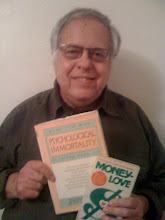The most disturbing trend I've heard about in recent weeks is the fact that such prestigious universities as M.I.T. have seen their most promising graduates take jobs on Wall Street rather than go into science and engineering as had been usual in the past. The reason is simple, there are more jobs on Wall Street in which a young, clever graduate can start making big bucks almost immediately. This involves moving financial instruments around, and contributes almost nothing to the public welfare.
For two years back in the 1980s, I earned my living mostly by playing poker. It was a very good living, and it was fun and exciting to do. I stopped doing it as a full time activity when I realized that I wasn't contributing anything real to the world. It's a sort of soulless existence, just moving money around rather than producing anything of practical use or beauty in the world. This is what these smart college graduates going to Wall Street to make their fortunes have chosen to do for themselves, to become soulless money-changers. And it takes something out of you, some important and vital part of what it means to be a fulfilled human being.
I think we'll figure out some ways of dealing with the disparity issue, but it might be a lot harder to figure out how to inspire bright young students that earning a lot of money easily and quickly is not the greatest aspiration one can have. Some years ago, I was hired as a consultant for a group of twenty women who either were or had been successful call girls. I worked with them on developing entrepreneurial skills, as their big issue was transitioning back into a normal lifestyle when they had been making an average of $100,000 a year by having sex with strangers. There were hardly any jobs available for women that paid near that amount, and most of them weren't educated for high-paying jobs. Six of them ended up starting a house cleaning business, and it did quite well. This, of course, was the same issue facing these college graduates who might be looking at some more creative and productive career than shuffling money on Wall St.
Jerry

No comments:
Post a Comment